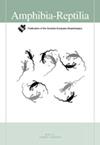Population densities and home range of the vulnerable Pyrenean brook newt in its core aquatic habitat
IF 1.3
4区 生物学
Q3 ZOOLOGY
引用次数: 0
Abstract
Accurate estimations of population size and space-use are critical issues, for assessing population trends and extinction risk. In this study, we applied spatially explicit capture-recapture (SECR) modelling customized for linear habitats to a three-year Capture-Mark-Recapture (CMR) monitoring of three populations of stream-dwelling Pyrenean brook newt (Calotriton asper), an endemic species of the Pyrenean mountain range. Our aim was to explore (1) spatial and temporal variation in population densities, home range size and individual detection probability during breeding season between populations and years, and (2) the influence of water temperature and flow on activity of newts. Estimates of population density range from 3044 to 4641 individuals/km of stream across the three years of the study. Linear home range along the stream was estimated to be 13.31 m from the home range centre on average over the three years. All detection probability estimates were similar, both between years and between sites, with a mean probability of 0.09, except in Fougax in 2020 where detection probability was 0.03. Activity of the Pyrenean brook newt was influenced by water temperature and flow, but these factors acted at different time scales. Overall, population densities are locally high in both populations but home range of the Pyrenean brook newt during breeding season is very small indicating a strong site attachment. The importance of water temperature and flow on activity emphasizes the sensitivity of the species to these factors that are forecasted to change in coming decades.脆弱的比利牛斯溪蝾螈在其核心水生栖息地的种群密度和栖息地范围
准确估计人口规模和空间使用是评估人口趋势和灭绝风险的关键问题。在这项研究中,我们将为线性栖息地定制的空间显式捕获-再捕获(SECR)模型应用于对比利牛斯山脉特有物种比利牛斯溪蝾螈(Calotriton asper)三个种群的三年捕获标记再捕获(CMR)监测。我们的目的是探索(1)种群和年份之间繁殖季节种群密度、家域大小和个体检测概率的时空变化,以及(2)水温和流量对蝾螈活动的影响。在三年的研究中,种群密度估计在3044至4641人/公里的溪流之间。据估计,三年来,溪流沿岸的线性栖息地距离栖息地中心的平均距离为13.31米。所有检测概率估计值在年份之间和地点之间都是相似的,平均概率为0.09,但在2020年的福加,检测概率为0.03。比利牛斯溪蝾螈的活动受水温和流量的影响,但这些因素在不同的时间尺度上起作用。总的来说,这两个种群的种群密度都很高,但在繁殖季节,比利牛斯溪蝾螈的栖息地范围很小,这表明它们有很强的场地附着性。水温和流量对活动的重要性强调了物种对这些因素的敏感性,预计这些因素将在未来几十年发生变化。
本文章由计算机程序翻译,如有差异,请以英文原文为准。
求助全文
约1分钟内获得全文
求助全文
来源期刊

Amphibia-Reptilia
生物-动物学
CiteScore
3.10
自引率
6.20%
发文量
39
审稿时长
6-12 weeks
期刊介绍:
Amphibia-Reptilia is a leading European multi-disciplinary journal devoted to most of the aspects of herpetology: ecology, behaviour, evolution, conservation, physiology, morphology, paleontology, genetics, and systematics.
Amphibia-Reptilia publishes high quality original papers, short-notes, reviews, book reviews and news of the Societas Europaea Herpetologica (SEH). The Societas Europaea Herpteologica (SEH) website is located at: www.seh-herpetology.org.
 求助内容:
求助内容: 应助结果提醒方式:
应助结果提醒方式:


